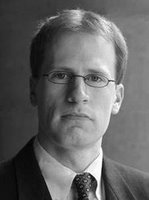
Yesterday, I spent some time finding out about Dr Nick Bostrom. The initial motivation was that he has a job going, but then it became self-propelling. Bostrom is the director of the Future of Humanity Institute in Oxford. (No, really). Sadly, I am ineligible for the vacancy they have because I won't be done with my PhD by the required deadline. However, as we shall see, that is almost certainly completely moot -- it wouldn't make a butterfly-wingflap of difference even if I had.
Bostrom has the kind of CV that you couldn't make up. No, seriously. Suppose you have a couple of friends over and you get totally wrecked on absinthe or something similarly hardline, and then to amuse yourselves you decide to make up fantasy CVs for youselves. I guarantee that your combined 180-proof-fuelled efforts would be put into the shade. First, this is because Bostrom really is one of those academic superstar overachievers with the kind of track record and testimonials that make the rest of us feel like we only just mananged to drag ourselves from the primordial soup on our runty little incipient legs. His PhD dissertation got recommended for publication in Routledge's Outstanding Dissertations series. That would be bad enough, but it was Nozick who recommended it. His list of publications is so long that he thoughtfully includes a synopsis of the illustrious journals and periodicals which have published his work in the header.
But actually, much though it grieves my poor little neo-postamphibious heart to say it, this kind of academic superstardom is not actually that unusual. There are scads of these annoying little prats all over the damn place taking all the jobs and forcing us to console ourselves with the thought that they clearly have no time to foster healthy interpersonal relationships. But this does not exhaust the Bostrom story. He is also a vintage, real-deal polymath and public intellectual. His home page indicates links to his academic works with a tiny mortarboard icon, and links to his popular works with a tiny bunch of cherries. (No, really).
He was once a standup comic. On television. He has a published volume of poetry. He's worked for the CIA.
So far, so sickeningly demoralising.
But the thing that really kept me awake last night wondering about my future as an academic was none of these. If it was, I'd never get any sleep. The trouble was the the startling and disconcerting fact that in addition to all this, Bostrom believes in things. He is interested in having an impact on the world, not just for the sake of making an impact, but because some impacts are, according to him, the kind that people should be making. And so, naturally, with his giant brain and fabulous (in the sense of stuff-of-fables) capacity for work, he is going to go and make the sort of impact that he judges to be the right kind.
The first thing that was disconcerting about this was that it was disconcerting at all. Ideally, although Dr Bostrom is surely right to note that it sounds pretty corny, we'd all want to "make a difference". But my erstwhile exposure to that attitude in the academic world has generally been the defensive, tail-between-the-legs kind which characterises the academic who's been told one too many times how pointless her existence is and what a non-contribution her work is to culture/society/humankind/whatever. Such people tend to have responses and activities (such as token involvement in thinktanks and education programs) in their lives all prepped and ready to respond to the question "But what does that matter for the real world?" This kind of thing makes me crazy because it is craven, insincere, and capitulates to the generally very under-developed claim that an academic, classically understood, is not "contributing" anything.
Bostrom, I surmise, couldn't give a toss what anyone supposes the role of an academic is. He has his own view on what he ought to do, and what everyone else ought to do, and is out there telling every kind of person whom he judges ought to hear it. And you just don't get the impression that he's doing it for profile (like some people) although he clearly sees that profile is necessary. For one thing, his work is too good. Do you hate this guy already?
Researching Bostrom's career yesterday has jumped all over many sleeping dogs in my mind. The oldest and most grizzled of these is the one which suspects that the very reason I'm doing all of this is that none of it is particularly meaningful to me. It simply isn't intimately attached to my ethical beliefs about the way the world ought to be and what I ought to be doing about that. Sure, I believe (really) that philosophical research of all kinds, even the most esoteric and abstract, is valuable if it's good. And I love my work -- it is both intellectually and sort of aesthically pleasing to me. But really? I'm not that invested.
This worries me. And now this worry has the form of Dr Nick Bostrom.
In the final analysis, I think it is all about the stand-up comedy. I was of one mind with my friend S when she said that there was something about the inclusion of this little factoid, late in Dr Nick's CV, that indicated that he knows what a pompous, obnoxious, superior little bastard he's being ... and he thinks it's kinda funny.


4 comments:
He certainly does sound like someone I could love to hate.
I am undecided on the issue of academics' attitudes toward "making a difference in the world." As you say, I've certainly met quite a few who have been pounded enough that they've only got the most token kind of belief that they are working to make a difference. But I also know quite a few who take that commitment seriously in various ways.
I guess the best way to respond is by thinking about myself, here, since I know my own motivations better than I can know someone else's. I certainly don't have the same sense of my ability to "make a difference in the world" as I did before I began graduate school. Sometimes I think that's not such a bad thing, a sign of maturity and of a more humble and honest conception of myself and a more complex understanding of the world. Sometimes I think it means I've lost something, something very important.
On the other hand, I take very seriously the idea that my job, at its core, is to introduce first-year students in college to some core ideas of humanism, ethics, and general thoughtfulness about the world. It's hard to talk about that mission without sounding pompous and corny, but in all seriousness, it's why I do this job. (God knows, I don't do it for the money.)
I watched Munich over the wekend, and it really shook me up, especially knowing that there are many on the Right who have attacked Spielberg and the film because it does not show the war on terror in black and white terms. One fundamental lesson of the movie is that there is a high price to be paid for engaging in a war on terror on those terms. It made me realize, again, that there are profound, fundamental lessons that need to be constantly relearned. Yes, Frank O'Connor and Hemingway and Anne Frank and Tim O'Brien and thousands of others have already shown us these lessons, but they have to be relearned. There is such an urge to pretend that life is simple and clear-cut.
I'm not saying this as well as I wanted to, I know, but I guess my real point is to say that I walked out of that theater thinking about the fact that my job as an academic and as a teacher really is desperately important. Last semester, I introduced seventy-five students to fundamental ideas about the constructedness of nature and about the implications our relationship with nature. For every one of them, these were all new ideas. Most of them will go on to be engineers, and I really do think that having been exposed to these ideas has the potential to make them think about their majors and their careers a little differntly.
So, I may not be running some massive, Very Important think tank and publishing Deep and Important books, but I am making a difference in the world. Sometimes I think teaching a bunch of first-year students is way harder and more important then writing another book convincing someone who's already a professional philosopher to see some corner of the academic discipline in a slightly different way.
Oops, sorry to leave such a long, rambling comment.
Definitely no need to apologise, and I think you said it very well. I too, feel desperately passionate and am very often zealously loud about my job teaching undergraduates. For some odd reasons having to do with the department I belong to and the way that degrees are set up here, most of the students I teach philosophy to are science majors, and looking at the kind of power to Impart The Knowledge that anyone in a white coat has these days (forget about the guy in the bishop's mitre -- get me the guy in the white coat with the lab safety glasses), I feel that giving them half an idea about the multiplicitous problems with things like "proof" and "truth" and induction and (heavens!) "science" is the most important thing I've ever done, and I know others that take this commitment very seriously indeed.
My difficulty is that I don't feel that way about my own research work. It is (for me) easy to be passionate about teaching, and virtually no-one is going to challenge your commitment to it because it is generally seen as A Good (in spite of the fact that many academics don't like to do it). But defending my research, which is technically (I don't even know what this means, buts let it go) the reason I'm here.
Bostrom scares me because he believes in the particular things which he works on, not simply that it is a good idea to convey ideas to people (which is generally what I think). Sure, I don't think just any idea is good to teach, but my sense of what qualifies seems to bear a tenuous relationship, at best, to the things upon which I spend the most intellectual energy.
Now look who's rambling!
Loved this post on Bostrom... and then found much to love in the comments as well. Thanks for this exchange.
Post a Comment